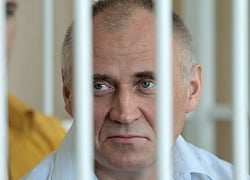Mikalaj Statkievich: Milinkievich’s dilemma looks fake
29- 15.04.2013, 14:00

Mikalaj Statkievich’s spouse cited the political prisoner’s opinion on the EU’s dialogue with Lukashenka.
The other day Maryna Adamovich posted on her Facebook account:
“I was asked for commentaries, but I categorically refused… But now I am preparing Mikalaj’s articles for publishing. I found them on an old USB drive. I do not remember now if it was published, but it was written for Barysau News in June 2009. Does not it seem to you that it is urgent today too? Nothing has changed in the arguments of the parties…
I hope Mikalaj will not be against it. But there is something symbolic in that the text popped up just now, I think. The text of almost four-year remoteness:
“Commentary on Milikievich’s letter
The chief editor of Barysau News newspaper Anatol Bukas suggested me to comment a letter by a former presidential candidate Aliaksandr Milinkievich that he received. I respect Anatol Uladzimiravich too much for his professionalism, courage and adherence to his principles even if someone might not like the commentary.
Mr. Milinkievich’s letter may be divided in three parts for convenience. In the first part, devoted to the analysis of the international situation around Belarus, the author of the letter criticizes the European Union’s previous policy towards our country, when official Minsk was demanded democratization, and praises the new policy of dialogue between Europe and Belarusian authorities. In the letter’s second part the author divides Belarusian opposition into those who exclusively fights Lukashenka and those, who support a European choice for Belarus. The third part of the letter is devoted to the unity of Belarusian pro-European forces, which is supposed to find realization by the means of a Congress of pro-European forces in Belarus, which the author suggests to summon. I should speak on each of these parts.
1). The analysis of the relations of the Belarusian authorities and the European Union does not recollect previous unsuccessful attempts of the West to establish a dialogue with official Minsk. An OSCE ambassador Wieck’s dialogue attempt alone is an enough example. All these attempts failed not due to the lack of flexibility of Western politicians, but only because there was enough Russian subsidies for our inefficient economy to have its head above water. But those are not these inaccuracies that are the main drawback of the letter’s first part. The problem is that the author did not make an analysis of the situation inside the country, did not answer the main question of whether the Belarusian regime is capable of democratizing under the influence of the West. Is it capable of democratizing at all? It is exactly the answer to this question that the opposition’s strategy depends on.
2).The dilemma for the opposition, as formulated by Milinkievich, “either to Europe or against Lukashenka” looks fake with not significant proof that a dialogue with the European Union is capable of democratizing Belarus. A successful European integration is impossible without the establishment of democracy in the country. The analysis of Belarus’ political and economic system, made by the European coalition two years ago, shows that all the major components of the system (state controlled economy, the electoral system, controlled media and parliament etc.) are interconnected, interlinked one with another and support each other. Attempts to democratize even one of the components lead to the collapse of the whole system. Thus, Glasnost, introduced by Gorbachev, the refusal from the control over media, once pulled down the Soviet system. The incumbent head of Belarus perfectly remembers that and for that reason will for no benefits agree on democratization, which he perceives as a threat of losing the power. Thus, from the point of view of the analysis, made by the European coalition and disproved by no one, the dilemma for the opposition would sound like “either to Europe without Lukashenka, or with Lukashenka to Asia”.
3). The unity of European forces in Belarus is actually very important. That is why it is not clear, why representatives of the Movement for Freedom, who have joined the initiative group for holding a Congress of European Forces, initiated by the European coalition, almost immediately started blocking the work of this group. All these months the, while rejecting the democratization strategy, suggested by us; have not suggested one of their own. Representatives of the movement were the only ones out of the Congress initiative group’s subjects, who contrary to the real actions of the regime, claimed that Europe’s influence is capable of democratizing the Belarusian regime. Instead of joint work on a common strategy of European forces and preparation of a joint congress, Milinkievich is now disseminating this letter about the preparation of his own congress with a similar name.
Despite all the declarations of unity, such activities lead to the split of the European forces of Belarus, although this split between those, who are ready to fight, and those, who hope for the “leading united Europe’s politicians”, seems objective.
No one argues with Mr. Milinkievich that the participation of our country in joint projects with united Europe is favorable for Belarus. But it is just that support or lack of support on the part of the Belarusian opposition and Milinkievich to this participation only influences it insignificantly and symbolically. But if the head of the Movement for Freedom wants so much to take the functions of a symbolic lobbyist of official Minsk in its cooperation with the European Union, then how does he want to combine this function with the proclaimed desire to compete against Lukashenka in presidential elections? It is impossible to simultaneously be a lobbyist or an intermediary and an opponent to the authorities, since it causes mistrust to his capabilities to carry out a function of an authorities’ intermediary and a function of their opponent with democracy supporters. One must choose – either an intermediary, or an opponent and fighter. This is the dilemma.
Mikalaj Statkievich, coordinator of the European coalition”.









